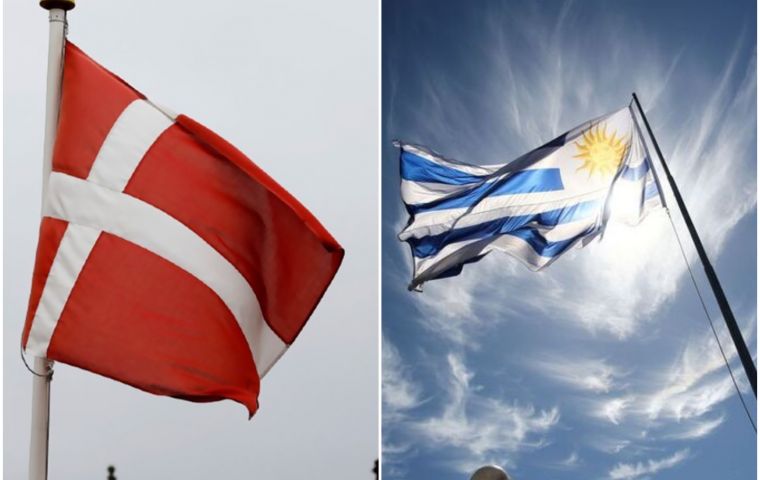MercoPress. South Atlantic News Agency
Denmark least corrupt country in the world; Uruguay in the Americas
 “The omnipresence of corruption in the Americas encourages many other crises that the region is going through,” Ferreira Rubio explained
“The omnipresence of corruption in the Americas encourages many other crises that the region is going through,” Ferreira Rubio explained Denmark scored 90 points out of 100, to the top Transparency International's Index as the least corrupt country in the world, followed by Finland and New Zealand (87 points each). At the other end of the table were Somalia, Syria, and South Sudan. Uruguay was a Latin American country with better grades.
Not much better faired Venezuela (14 points), Haiti (17), Nicaragua (19), and Honduras (23), the poorest scores in Latin America. On the other hand, Uruguay (74) and Chile (67) were the best-rated in the region, followed by Costa Rica (54), although this country's performance was marred by recent corruption cases and allegations of illicit campaign financing by current President Rodrigo Chaves.
The rest of the Latin American countries have scores below 50, such as Cuba (45), Colombia (39), Argentina, Brazil (38), Ecuador, Panama, Peru (36), El Salvador, Dominican Republic (33), Bolivia, Mexico (31) and Paraguay (28).
Global data reveal a stagnation in the fight against corruption and highlight the link to violence. “Corruption and conflict feed back on each other and threaten lasting peace,” the report highlights. The phenomenon is especially visible in Latin America, where the lines between public institutions and criminal networks have blurred.
The lack of progress in the fight against corruption “has resulted in the region in a weakening of democratic institutions and an increase in violence and an advance of organized crime in public institutions,” Luciana Torchuaro, TI's regional advisor for Latin America, told AFP.
TI also underlined the case of Peru with six changes of government in six years and five former presidents under investigation for corruption, including Pedro Castillo.
In other countries, public agencies have been co-opted by “elites and organized crime” and law enforcement authorities ignore illegal activities or human rights abuses in exchange for money.
In Venezuela, which has the worst score in Latin America, criminal groups maintain their activities in the mining sector in exchange for irregular payments to the military, TI said. Illegal economic activities accounted for 21% of its GDP in 2021.
The report also mentions Guatemala (24) and Honduras, where “there is evidence to suggest” the influence of organized crime in politics. In Guatemala, this situation affects journalists, activists, and prosecutors, some of whom have been forced into exile.
The NGO also saw it from a negative perspective that Honduras, El Salvador, and Ecuador have declared states of exception, a measure that reduces “transparency and accountability.” Peru too has made such a declaration in recent weeks.
In Argentina, Vice President Cristina Kirchner was convicted of corruption in a case of public works and the Supreme Court Justices face possible impeachment.
Argentine lawyer Delia Ferreira Rubio, president of Transparency International, was critical of the situation in Latin America in terms of transparency: “The stagnation and regression of the fight against corruption in the region coincides with a marked deterioration of democratic institutions, the attack on the independence of judges and the questioning of the press and especially investigative journalism. The impunity of the corrupt only increases political instability and the lack of confidence of citizens who end up tolerating corruption as if their own rights and liberties were not at stake. Latin America -with the exception of Uruguay, Chile, and Costa Rica- is immersed in this vicious circle. It is essential to reverse the trajectory.”
“The omnipresence of corruption in the Americas encourages many other crises that the region is going through. Fragile governments fail to curb criminal networks, social conflict, and violence, and some exacerbate threats to human rights by concentrating power under the guise of responding to insecurity. The only viable way forward is for leaders to prioritize anti-corruption measures in order to root out corruption and allow governments to fulfill their primary function, which is to protect people,” she added.
The Corruption Perceptions Index measures every year the perception of corruption of businessmen and experts, although only in relation to the conduct of the public sector, that is, in the political and administrative sphere. It is calculated using 13 external sources, including the World Bank, the World Economic Forum, private companies specializing in risk analysis, consulting firms, and expert committees. The scores reflect the opinions of specialists and businessmen on how they perceive corruption in the state.
To be included in the index, a country or territory must have been evaluated by a minimum of three sources. Each country's score is determined by calculating the average of all available standardized scores for that country, rounded to a whole number.
See the full list:Transparency International Index 2022




Top Comments
Disclaimer & comment rulesCommenting for this story is now closed.
If you have a Facebook account, become a fan and comment on our Facebook Page!